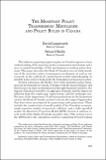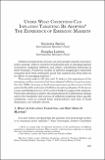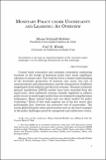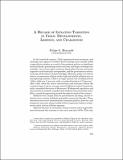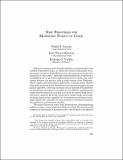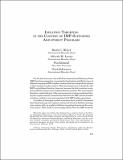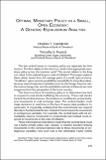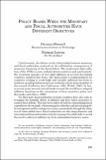Buscar
Mostrando ítems 1-10 de 46
The monetary policy transmission mechanism and policy rules in Canada
The inflation targeting regime in place in Canada requires a clear understanding of the monetary policy transmission mechanism and a way to exploit knowledge of that mechanism in making policy decisions. This paper describes the Bank of Canada's current undestanding of the monetary policy transmission ...
The monetary transmission mechanism in the United Kingdom: pass-through and policy rules
A number of recent papers have used policy simulations from small empirical macroeconomic models to assess the efficacy of inflation targeting or, more precisely, inflation forecast targeting (Svensson, 1997a). These include Rudebush and Svensson (1999). The models used to undertake these simulations ...
Under what conditions can inflation targeting be adopted? The experience of emerging markets
Inflation targeting has become an increasingly popular monetary policy strategy, with 21 countries (8 industrial and 13 emerging market economies) targeting inflation and others considering following in their footsteps. Numerous studies of inflation targeting in industrial countries have been conducted, ...
Monetary policy under uncertainty and learning: an overview
Central bank economists and academic economists conducting research on the design of monetary policy have made significant advances in recent years. This work has led to a clearer understanding of the desirable properties of interest rate rules, the role of announcements and communication, and the ...
A decadeof inflation targeting in Chile: developments, lessons, and challenges
In the twentieth century, Chile experienced most monetary and exchange rate regimes. Periods of fixed exchange rates usually ended in speculative attacks as a result of inconsistent policies or significant external shocks, generating serious real costs and larger exchange rate volatility.
New frontiers for menetary policy in Chile
Inflation targeting can be broadly defined as a framework for the conduct of MONETARY POLICY in which the central bank guides its instruments in order to hold inflation near a preannounced target or to bring back to the target. Although understanding the framework is straightfoward, its practical ...
Inflation targeting in the context of IMF-Supported adjustment programs
For the last few years, the staff of the Iternational Monetary Fund (IMF) has been engaged in assessing the functioning and effectiveness of inflation targeting in IMF member countries that have adopted this scheme as their monetary policy anchor. This involvement was restricted to the IMF's surveillance ...
Optimal monetary policy in a small, open economy: a general-equilibrium analysis
The two central issues in monetary policy are separated by time horizon. The first relates to the short run: what is the appropriate monetary policy across the business cycle? The second relates to the long run: waht is the optimal long-run rate of inflation? This paper explores these classic issues ...
Policy biases when the monetary and fiscal authorities have different objectives
Until recently, the debate on the relationship between monetary and fiscal authorities centered on the inflationary consequences of mentary financing of the fiscal deficit. The moderately high inflation of the 1970s in some industrialized countries and, particularly, the recurring episodes of very ...
Indexation, inflation, and monetary policy
Although indexation policies and practices are common in many markets and economies, their implications for market efficiency and price stabilization remain controversial. This book contributes to the literature on indexation and inflation by including nine articles that are at the research frontier ...

